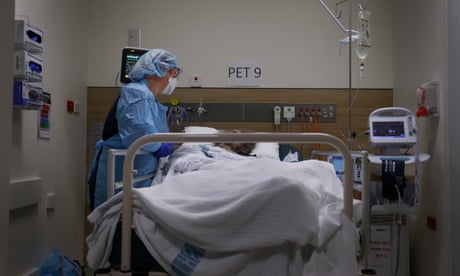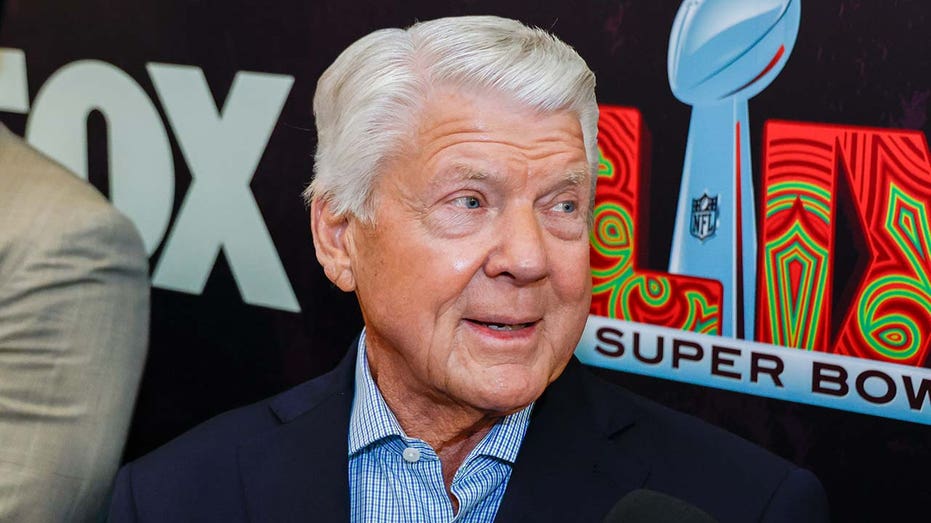- by foxnews
- 04 Mar 2025
?Turn them over faster?: the bleak reality inside NSW?s hospitals
‘Turn them over faster’: the bleak reality inside NSW’s hospitals
- by theguardian
- 08 Jan 2022
- in news

Patients discharged early, cancer specialists diverted to Covid wards, non-Covid patients mixed in with infected ones: this is the bleak picture from inside New South Wales hospitals despite government officials stressing they would cope with the coming surge without need for another lockdown. The revelation comes as the share of double-vaccinated patients in intensive care units makes up the majority for the first time.
Doctors, paramedics and patients say Friday's decision to halt non-urgent elective surgery until February will only exacerbate health issues.
The premier, Dominic Perrottet, released government modelling on Friday that predicted Covid-related hospitalisations will peak between 3,000 and 6,000 patients by the third or fourth week of January. As of 8pm on Thursday, the tally stood at 1,738.
"The modelling today is encouraging," he told Friday's media conference. "Even on a worst-case scenario, [NSW] is in a strong position to deal with the challenges that we face."
That confidence, though, is not shared by many within the health system. An increasing reliance on a fatigued workforce to perform roles beyond their expertise and experience risks reduced care and the prospect of medical errors, staff say.
Even though Omicron is 50-70% less likely than the Delta strain to cause hospitalisations, its far higher infection rate means many more people will get it.
Worryingly, as of 2 January, the percentage of those in hospital who were fully vaccinated has risen to 67.4%, according to data compiled by the health department's critical intelligence unit. As of that date, fully vaccinated people made up 50.5% of the Covid patients in intensive care, becoming the majority for the first time.
Hospitals are now being told to discharge patients faster, whether recovering from other ailments, such as strokes, heart attacks and trauma, or even Covid, a senior doctor said.
"We've got to turn them over faster because there are so many more people needing beds," the doctor said.
Concord hospital, which earlier this week told staff to expect Covid patient numbers to triple, informed them on Friday "to discharge any patients we could", another senior doctor told Guardian Australia.
Senior staff at one of Sydney's largest teaching hospital at Liverpool, meanwhile, described the current crisis they face as of "epic proportions".
NSW Health deputy secretary Susan Pearce told Friday's press conference the government was "calling out everyone who is a registered health professional", and said she would be willing to front up for duties herself if needed.
"We're looking at care assistants who can go in and help the more experienced staff," she said. "We're looking at bringing in, if possible, interns early. We're looking at nursing graduates who may be able to be brought on early."
Pearce predicted "this [surge] will rise quickly and pass quickly. We also need to reassure our community that we will be able to manage this."
The altering of roles, however, is already affecting care. One woman due to undergo ovary removal soon as part of cancer treatment at a southern Sydney hospital now expects the operation to be bumped back.
"My oncologist is rostered on [Covid duties] this month," she said. The patient had hoped to have a lesion on her scalp seen by the specialist, a meeting that now won't happen. "Just hoping it's not a metastasis. What if it is?"
For Alex Wilks, who took his wife, Kittie, to Gosford hospital's emergency department on Monday to X-ray her badly swollen ankle, the issue wasn't of a shortage of staff but a lack of Covid-safe facilities.
"The staff were friendly and efficient and had the whole thing wrapped up in under four hours," Wilks said. "However, they put her in an emergency room where there would normally be a bed and some privacy curtains; this room had three chairs.
"They then put two clearly Covid-positive cases in there with her for the remainder of the three-four hours I am assuming this from the symptoms they had - coughing - and a conversation they had with the nurse: 'So all your other family members who were at the event have tested positive?' 'Yes.'
"I have made a complaint with the hospital about it and am expecting a report on why my wife, who showed no symptoms of Covid, was exposed to the virus like this. They have assured me they will look into it and get back to me within 35 days.
"I feel people need to know they are putting their lives at risk going to the hospital now."
Guardian Australia has sought comment from Gosford hospital.
Patients who need ambulance care to attend hospital may also find wait times are getting longer.
Chris Kastelan, the NSW president of the Australian Paramedics Association and a 24-year veteran of the service, said emergency department ramping or "bed block" was the worst for at least a decade.
Staff are routinely working shifts up to 18 hours long compared with the normal 12-hour stint. "And sometimes this is without a meal break," Kastelan said. "That's a bit of a safety concern."
The waiting period for an ambulance after making a triple-zero call now often stretches beyond 50 minutes because of the workload and crews available.
Stage 3 escalation, when all training is halted and all registered paramedics - including executives - are asked to be on duty "was a bit of an anomaly in the past, but certainly it's being hit more and more regularly", Kastelan said.
"I would suggest south-west Sydney and western Sydney are nearly in a constant state of stage 3 - the highest category before your workload outstrips your ability to provide service," he said.
Staff are being asked to cancel approved leave, while all long-service leave or leave without pay are not being approved, he said. Crews are preparing for the coming peak in Covid cases "with a level of trepidation".
"You can spend billions of dollars on infrastructure and new ambulances and equipment and a new headquarters and all those fantastic things, but I think at this point in time, we're all recognising that the glue that holds it all together is people," Kastelan said.
Do you know more about pressure in the healthcare system? Contact peter.hannam@theguardian.com. You can remain anonymous.
- by travelandtourworld
- descember 09, 2016
Rome's Exclusive Nightlife The Ultimate Guide to Luxury Prestige and VIP Experiences
Rome, the Eternal City, is celebrated for its awe-inspiring architecture, deep-rooted history, and electrifying nightlife. As twilight descends over the Colosseum and the city’s cobblestone streets begin to pulse with energy, discerning travelers and locals alike seek out the most exclusive experiences the city has to offer. From high-end rooftop lounges and private clubs to bespoke luxury gatherings, Rome’s nightlife is a refined blend of sophistication and indulgence.
read more


